Coursera’s 2021: Year in Review
In 2021, Coursera went public and is on track to end the year with 21M new learners and 400M in revenue.
In 2021, Coursera went public on the NYSE, raising $519 million. Since then, its stock price has been steadily falling even though revenue has been increasing.
Compared to 2020, revenue has jumped 43% and losses 143%.
In terms of new learners, Coursera is on track to gain 21 million new learners in 2021. Though lower than the 31 million of last year, it’s still a lot more than the 8 million from 2019. The company has done much better than its nearest MOOC competitors in maintaining the pandemic boost.
In 2021, it launched and shutdown community guided projects, dabbled in cohort-based learning with a new credential, announced 10 new degrees, and more.
For Class Central‘s complete analysis of Coursera’s 2021, keep reading. For our previous years’ analyses, follow the links:
- Coursera’s 2020: Year in Review
- Coursera’s 2019: Year in Review
- Coursera’s 2018: Year in Review
- Coursera’s 2017: Year in Review
- Coursera’s 2016: Year in Review
Early this year, I read through Coursera’s 240-pages IPO prospectus and discovered interesting details like Rhyme’s acquisition cost, Andrew Ng’s DeepLearning.AI revenue, and how much Coursera paid its university partners. You can find the in-depth analysis here.
Coursera’s Impact Report also provides some details about its demographics and different segments like Coursera for Campus and Coursera for Governments.
By The Numbers
| 2016 | 2017 | 2018 | 2019 | 2020 | 2021 | |
| Employees | NA | NA | 330+ | 450+ | 600+ | NA |
| Revenue | $60m | $95.6m | $141.8m | $184.4m | $293.5m | $400m+ |
| Courses | 1,700 | 2,700 | 3,100 | 3,800 | 5,5401 | 8,2502 |
| Specializations | 160 | 240 | 310 | 400 | 570 | 820 |
| Degrees | 2 | 4 | 12 | 16 | 25 | 34 |
| Learners | 23m | 30m | 37m | 45m | 76m | 97m3 |
| Coursera for Business customers | 30 | 500 | 1,500 | 2,000 | 2,300+ | 2,900 |
- [1] 4600 courses with 940 Guided Projects from Coursera Project Network
- [2] 6000 courses with 2250 Guided Projects from Coursera Project Network
- [3] Estimated based on adding 5 million learners per quarter
Revenues
| Revenue | 2017 | 2018 | 2019 | 2020 | 2021 (till Q3) |
| Total | $95.6m | $141.8m | $184.4m | $293.5m | $300.4m |
| Consumer | $85.7m | $107.5m | $121m | $193m | $180.4m |
| Enterprise | $7.4m | $26.0m | $48.2m | $70.8m | $84.5m |
| Degrees | $2.5m | $7.4m | $15.1m | $29.9m | $35.6m |
| Net Loss | ($53.3m) | ($43.6m) | ($46.8m) | ($66.8m) | ($97.6m) |
Now that Coursera is a public company, we get a clear picture of their revenue. Till 2021 Q3, Coursera had made $300m and lost almost $100m. It’s on track to make over $400m this year.
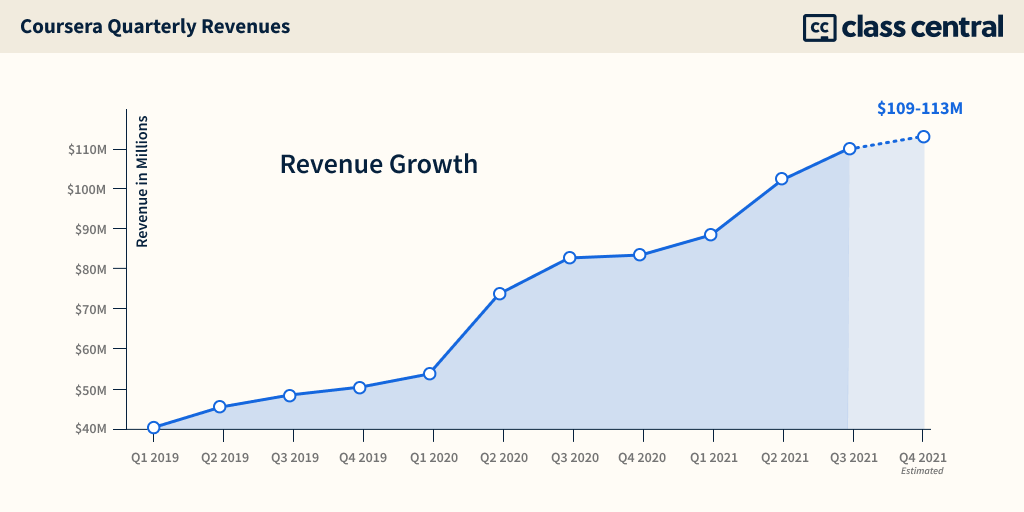
It’s seen revenue growth across its three different revenue streams: Consumer, Enterprise, and Degrees. In the first three quarters of 2021, revenue grew by 43% while losses more than doubled.
| Revenue | 2020 (till Q3) | 2021 (till Q3) | Year over Year |
| Total | $210.2m | $300.4m | 43% |
| Consumer | $139.9m | $180.4m | 29% |
| Enterprise | $49.8m | $84.5m | 70% |
| Degrees | $20.6m | $35.6m | 73% |
| Net Loss | ($40.1m) | ($97.6m) | 143% |
Enterprise seems to be Coursera’s most promising segment with revenue growth at 70%, and with the segment more than doubling the revenue of their Degree segment.
Courses
In terms of numbers of courses, 2021 saw the biggest increase, with 2700+ new courses added to the platform. But almost half of these courses didn’t come from Coursera’s university partners, but from the Coursera Project Network.
In 2021, Coursera tried to further boost its course count by letting learners create courses, but this was recently shut down as reported exclusively by Class Central.
Here are the ten most popular new courses launched by Coursera in 2021, and all of them are from Google:
- Foundations: Data, Data, Everywhere
- Foundations of Project Management
- Foundations of User Experience (UX) Design
- Ask Questions to Make Data-Driven Decisions
- Prepare Data for Exploration
- Project Initiation: Starting a Successful Project
- Process Data from Dirty to Clean
- Start the UX Design Process: Empathize, Define, and Ideate
- Analyze Data to Answer Questions
- Data Analysis with R Programming
One fifth of Class Central’s 100 most popular courses launched in 2021 were launched by Google on Coursera.
Specializations, MasterTracks, Professional Certificates, and University Certificates.
| Type | 2018 | 2019 | 2020 | 2021 |
| Specializations | 310 | 400 | 570 | 820 |
| Professional Certificates | 0 | 13 | 26 | 55 |
| University Certificates | 0 | 0 | 0 | 16 |
| MasterTrack | 3 | 6 | 18 | 22 |
In 2021, Coursera added a new category of certificates called University Certificates (more about them below). This was perhaps done to separate it from Professional Certificates which are created by companies like Google, Facebook, IBM, Intuit, and Salesforce.
In particular, the certificates from Google have been extremely popular. They’ve been made available to US community colleges and Career and Technical Education (CTE) high schools for free. Some of these certificates are also eligible for college credit.
Online Degrees
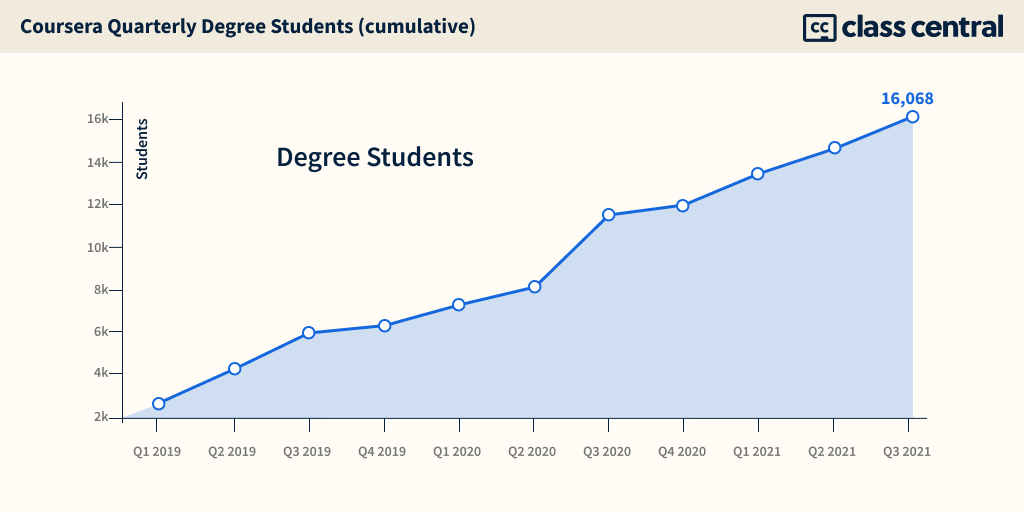
In 2021, Coursera added 10 new degrees, including 2 bachelors, 2 postgraduate degrees, and 6 masters, taking the total number of degrees to 34. None of the new degrees came from its US university partners.
In the third quarter of 2021, Coursera added 1400+ new degree students, taking the total to 16k+ students. But we also noticed that, even though the number of students is increasing, Coursera’s degree revenue is dropping.
In Q3 2021, Coursera’s Degrees segment made $11.6M compared to $11.9M in Q2.
| Degree Name | University | Cost |
| [+] Bachelor of Science in Marketing | University of London | £12,000 – £16,000 |
| [+] BSc Business Administration | University of London | £12,000 – £16,000* |
| [+] Maestría en Dirección de Empresas (MBA) | Universidad de Palermo | USD 11.640 | ARS 1.164.000 |
| [+] Master of Business Administration | Fundação Instituto de Administração | $10,000 USD |
| [+] MBA in Business Analytics | O.P. Jindal Global University | Rs. 550,000 / $7,500 USD |
| [+] M.A. in International Relations, Security, and Strategy | O.P. Jindal Global University | Rs. 450,000 / $6,000 USD |
| [+] M.A. in Public Policy | O.P. Jindal Global University | Rs. 450,000 / $6,000 USD |
| [+] Global Master’s in English Language Teaching Leadership | Tomsk State University | 1,050,000 RUB |
| [+] Postgraduate Diploma in Applied Statistics | Indian Statistical Institute | $6,000 |
| [+] Postgraduate Certificate of Public Health | Imperial College London | £6,500 or £10,725 |
| Master of Science in Management | University of Illinois | $11,052 |
| Bachelor of Applied Arts and Sciences | University of North Texas | ~$40k |
| Maestría en Inteligencia Analítica de Datos | Universidad de los Andes | $35.280.000 COP |
| Master of Science in Data Science | University of Colorado Boulder | $20,010 |
| Master of Science in Population and Health Sciences | University of Michigan | $43,500 – 47,500 |
| Master of Business Analytics | HSE University | 832,000 – 1,280,000 RUB |
| Master of Computer Vision | HSE University | 660,000 – 1,320,000 RUB |
| Master of Data and Network Analytics | HSE University | 600,000 – 1,200,000 RUB |
| Master of Finance | HSE University | 720,000 – 1,280,000 RUB |
| Master of Machine Learning and Data Science | Imperial College London | £28,000 |
| Maestría en Ingeniería de Software | Universidad de los Andes | $9,800 |
| Master of Data Science | Natural Research University Higher School of Economics | 675,000 – 1,350,000 RUB |
| Master of Science in Electrical Engineering | University of Colorado Boulder | $20,010 |
| Master of Computer and Information Technology | University of Pennsylvania | $26,300* |
| Global MBA | Macquarie University | AUD $39,600 |
| Bachelor of Computer Science | University of London | £11,229 – £16,790 |
| Master of Computer Science | Arizona University | $15,000 |
| Global Master of Public Health (GMPH) | Imperial College London | £6,500 or £10,725 |
| Master of Public Health | University of Michigan | $43,500 – 47,500 |
| Master of Applied Data Science | University of Michigan | $31,688-$42,262 |
| Master of Business Administration (iMBA) | University of Illinois | $21,104 |
| Master of Computer Science (Featuring Data Science Track) | University of Illinois | $21,440 |
| Master’s of Accounting (iMSA) | University of Illinois | $20,564 – $27,200 |
| MSc Innovation and Entrepreneurship | HEC Paris | 21,950 EUR |
Community Guided Projects
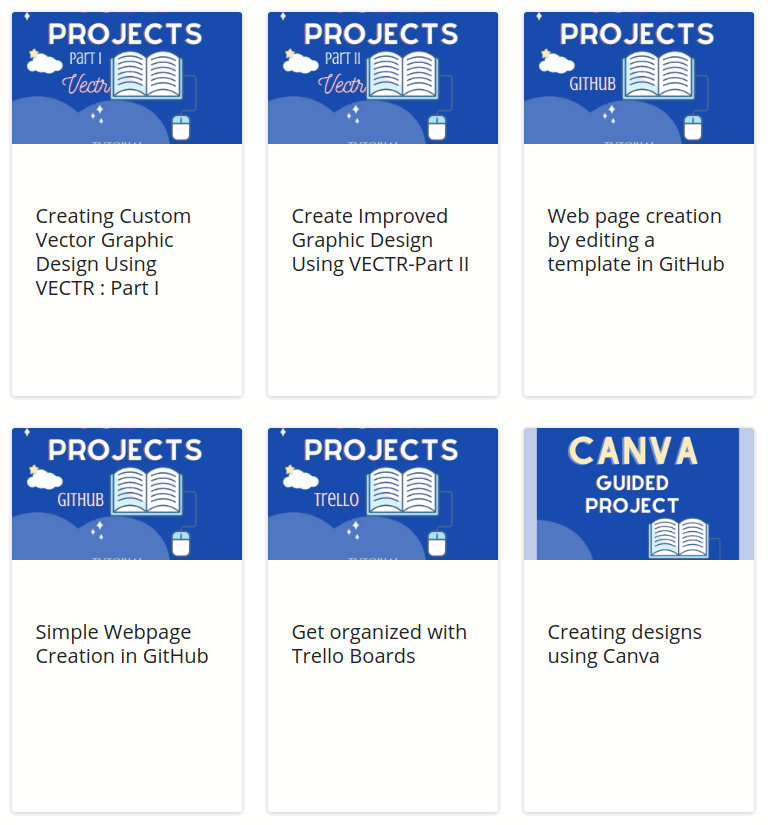
Last year, for the very first time, Coursera allowed individuals or “subject matter experts” to create courses. Previously, only Coursera’s partner universities and institutions could do so. Coursera called these new courses Guided Projects.
Guided Projects were a product of Coursera’s $10m acquisition of the edtech startup Rhyme in 2019.
In 2021, Coursera took it a step further by letting their learners create courses that would be entirely free. But just a couple of months into the experiment, Coursera decided to shut down Community Guided Projects (as reported exclusively by Class Central).
Instructors who create high quality, popular projects were invited to upgrade their projects to Coursera’s Projects Network — thus dropping the “Community” label.
University Certificates: Cohort Based Learning
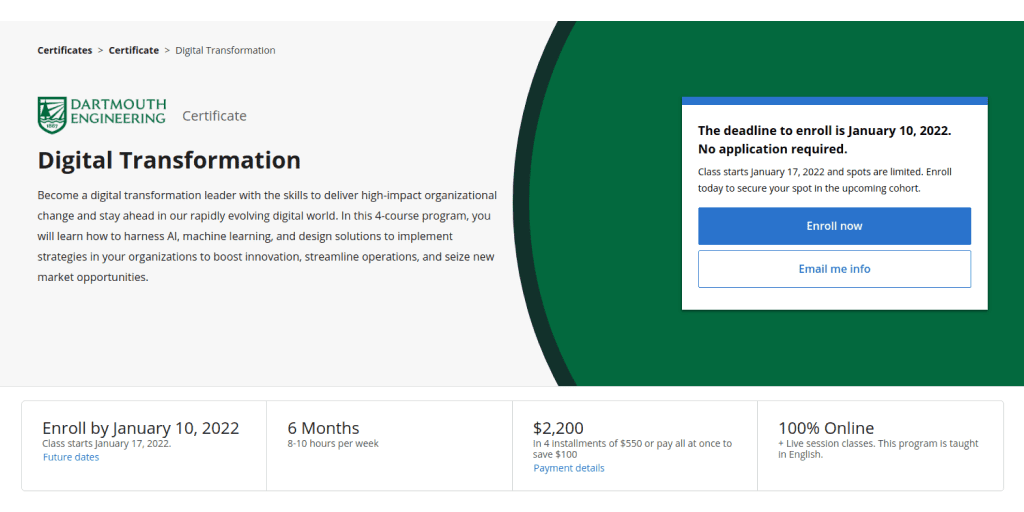
In 2021, Coursera launched University Certificates, which are cohort-based and include live classes, office hours with instructors, and projects.
Note that unlike Coursera’s other microcredentials, University Certificates are issued exclusively by the university: their certificate of completion doesn’t mention Coursera, only the university. For instance, University Certificates offered by IIT Bombay look like this:
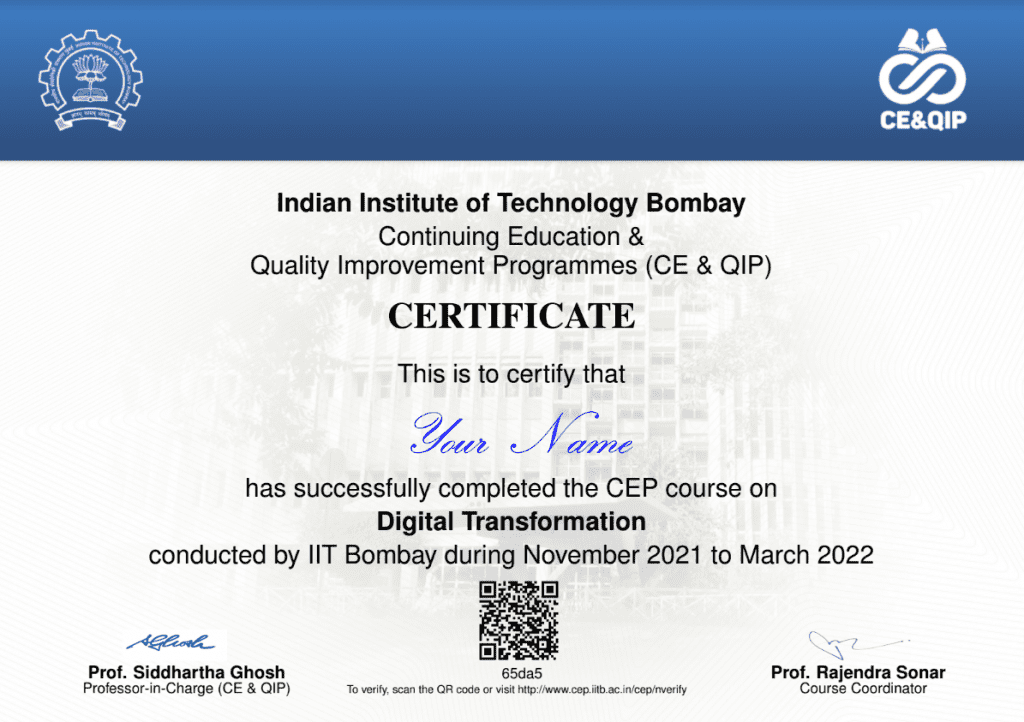
Currently there are 16 such certificates, of which only three come from US universities: Dartmouth, Duke, and ASU. The rest come from India: IIT Bombay, IIM Kozhikode, IIT Roorkee, and IIM Calcutta.
Peer Grading Problems

Early this year, my colleague @pat wrote about the challenges of peer assessments at scale, which even got a response from a Coursera assessments senior product manager.
As if on cue, during the conference, Coursera announced several changes related to academic integrity. One is a new prompt shown before submitting peer assessments, reminding learners about Coursera’s Honor Code. According to Jeremy Rudy, Head of Degrees Product at Coursera, the prompt reduced plagiarism by 15%.
Coursera also introduced a Similarity Score for peer assessments, powered by Turnitin. It tells learners whether Coursera thinks their work is plagiarized before they submit it. It’s only available for Coursera for Campus — not all Coursera users.
Coursera Conference 2021
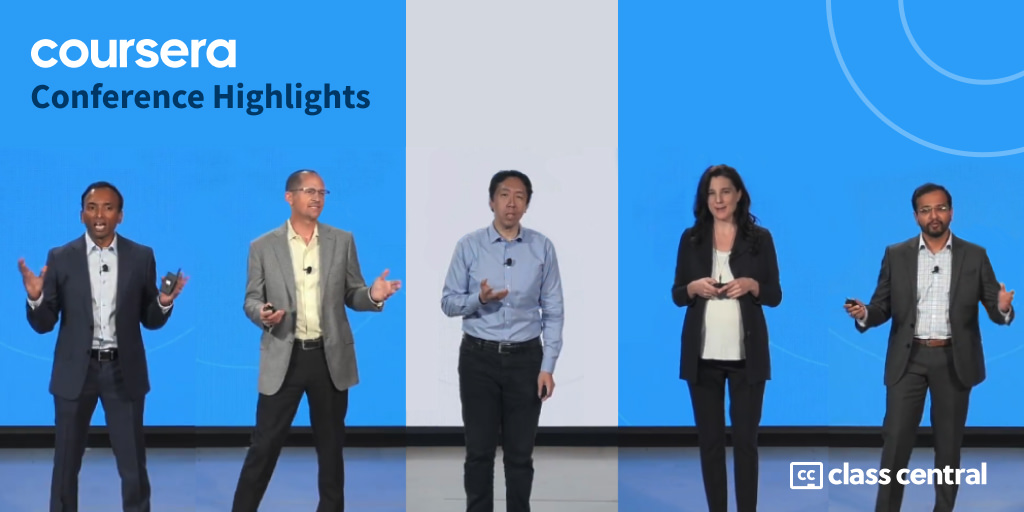
Due to the pandemic, Coursera Conferences, previously limited to their partners, have gone online and are open to everybody. In the 2021 conference, coursera introduced five new degrees, shared growth numbers, and talked about new product updates.
You can read the Conference highlights here.
Searching within Courses
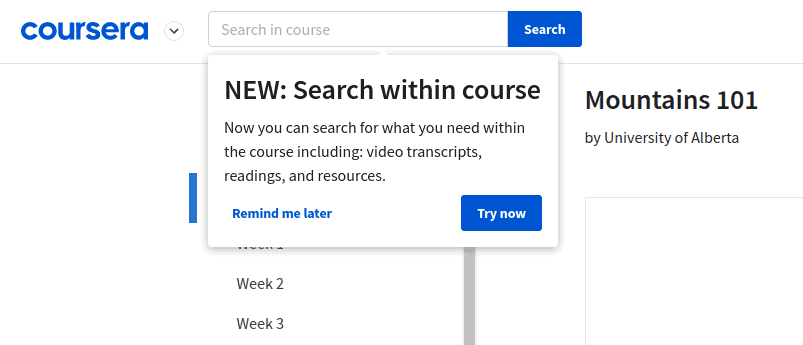
Coursera now allows users to search within courses, with results pointing to specific points in course videos.
Coursera has had video transcripts for a while, right underneath each video. Clicking specific parts of the transcript would allow you to jump to the corresponding point in the video, or to create a note. But transcripts weren’t searchable course-wide. This has now changed.
Leadership
In 2021, Coursera’s leadership team didn’t change.
Here is how the current leadership team looks (excluding advisors):
- Jeff Maggioncalda, CEO
- Shravan Goli, Chief Product Officer and Head of Consumer Revenue
- Kim Caldbeck, Chief Marketing Officer
- Betty Vandenbosch, Chief Content Officer
- Rich Jacquet, Chief People Officer
- Richard Wong, Vice President of Engineering
- Leah Belsky, Senior Vice President of Enterprise
- Ken Hahn, Chief Financial Officer
- Xueyan Wang, Vice President of Services
- Anne Tuttle Cappel, General Counsel

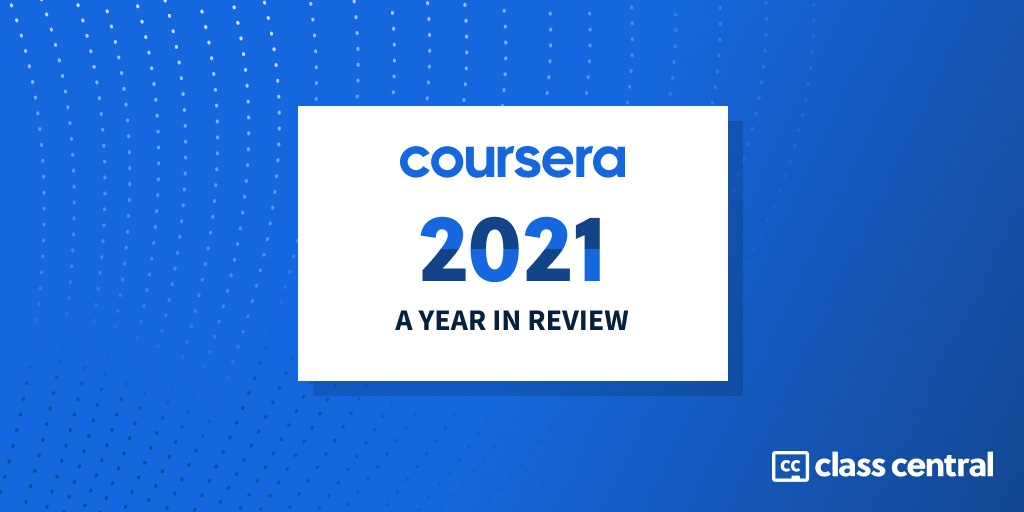






Tina
Always such a wealth of information in your articles. Thank you so much for all of this. It’s greatly appreciated.